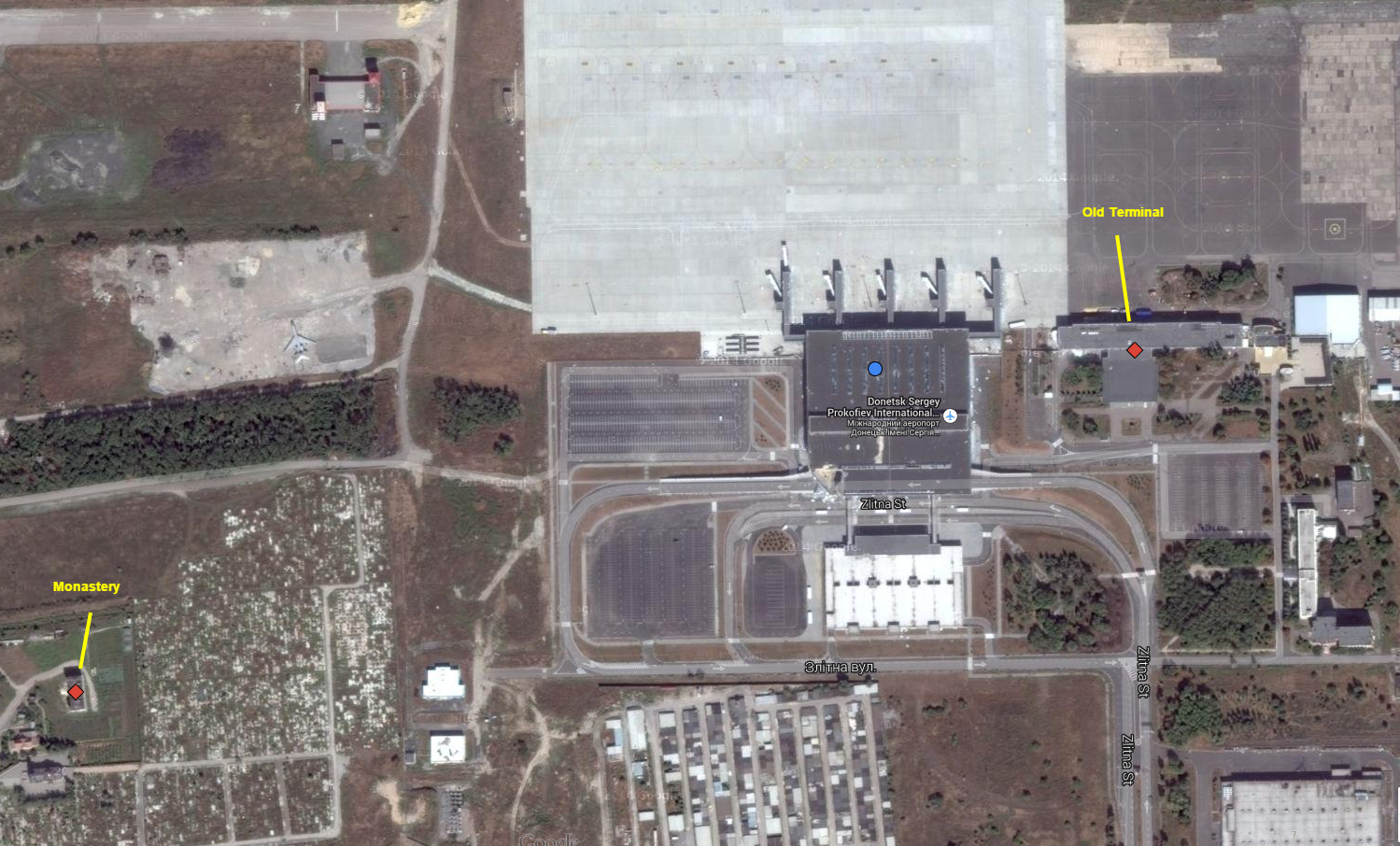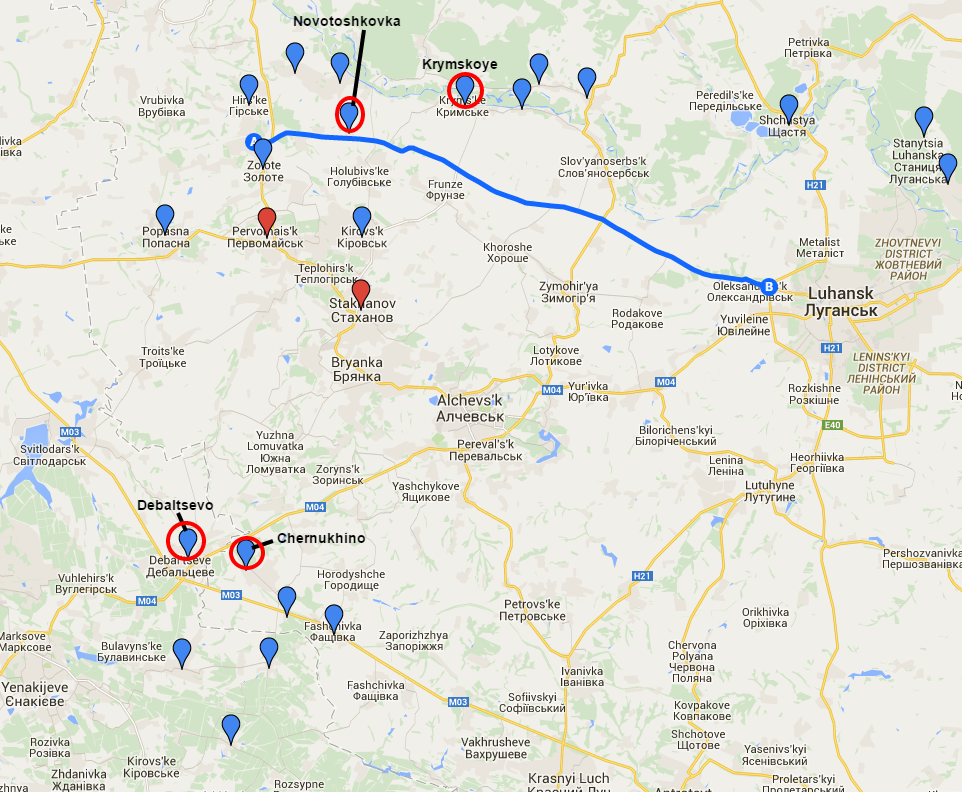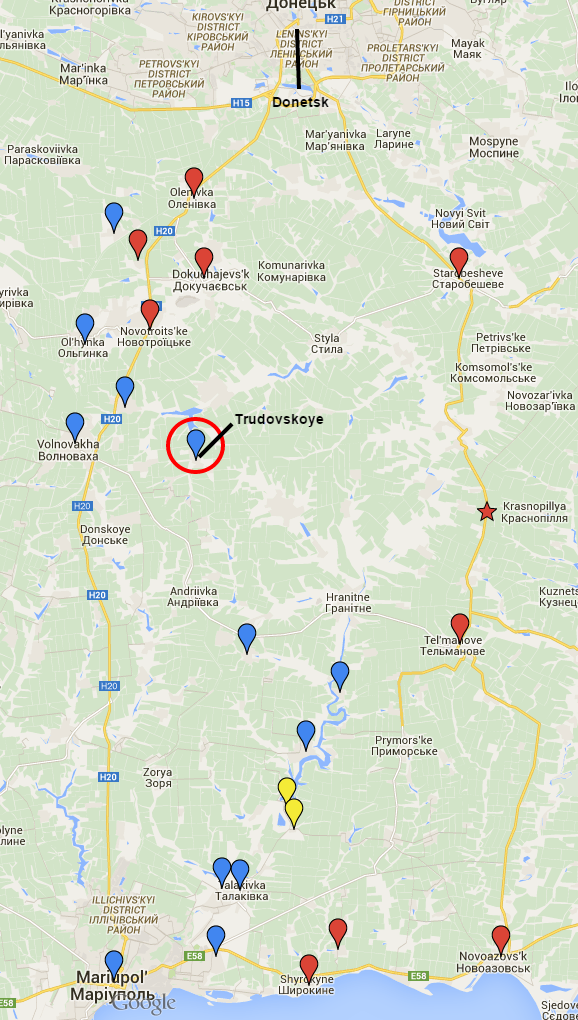Yesterday’s live coverage of the Ukraine conflict can be found here. An archive of our liveblogs can be found here. For an overview and analysis of this developing story see our latest podcast.
Please help The Interpreter to continue providing this valuable information service by making a donation towards our costs.
View Ukraine: April, 2014 in a larger map
For links to individual updates click on the timestamps.
For the latest summary of evidence surrounding the shooting down of flight MH17 see our separate article: Evidence Review: Who Shot Down MH17?
The Kremlin web site announced early this morning at 1:45 Moscow time that a late-night conference call took place with President Vladimir Putin, German Chancellor Angela Merkel, French President Francois Hollande and Ukrainian President Petro Poroshenko.
The call was a continuation of the “Normandy format” of quadripartite talks on Russia’s war against Ukraine, so named for the initial meeting in June 2014 during the Normandy Landing anniversary celebrations in France.
The Interpreter has a translation of the Kremlin’s news brief:
The discussion of the crisis situation in Ukraine is continuing. In the context of international efforts to foster a peaceful settlement of the internal Ukrainian conflict the need to ensure a durable ceasefire in the Donbass was noted.
The importance was noted of a rapid convening of a meeting of the contact group in the interests of implementation of the Minsk agreements and establishment of a dialogue between Kiev and the southeast. Among the priorities, in particular, are designated an exchange of forcibly-held persons and the withdrawal of heavy artillery from the line of contact by the conflicting sides.
The questions of issues of economic restoration of suffering regions and provision of humanitarian and social support for the population were also discussed.
It was agreed to continue telephone contacts in the “Normandy format” in the near future.
Putin has long feigned that the Kremlin’s aggression against Ukraine is merely a civil war between nationalists and separatists, despite abundant proof of the Kremlin’s military assistance with armor and troops in southeastern Ukraine. The fact that Putin is taking part in the talks and the Russian-backed separatists are not — although they are in the Minsk talks — is one obvious indication of Kremlin involvement.
Kremlin.ru doesn’t say when the phone call took place, but the announcement of it was made in the wee hours, and that suggests that Putin may have been interested in heading off further Western sanctions and appearing more amicable amidst a growing economic crisis in Russia. Yet nothing about the announcement says anything about any new initiative or a willingness to cease military support to insurgents. This week the Russian military is once again conducting training exercises near the Ukrainian border, and as LiveMap has reported, 200 Russian generals and other top brass are currently meeting in Rostov.
US President Barack Obama will (somewhat reluctantly) sign into law a bill passed by Congress which will levy sanctions against Russiaand increase support for Ukraine. AP reports:
White House spokesman Josh Earnest said Obama continues to have misgivings about the bill, which cleared Congress with overwhelming support, but believes the legislation still gives him the flexibility he needs…
The bill would require the president to impose penalties on state-owned arms dealer Rosoboronexport and other Russian defense companies tied to unrest in Ukraine, Moldova, Georgia and Syria. The sanctions would be extended to individuals and entities that help the companies.
“We do have concerns about that legislation because while it preserves flexibility it does send a confusing message to our allies because it includes some sanctions language that does not reflect the consultations that are ongoing,” Earnest said.
The bill would give the president the authority to provide lethal and nonlethal military assistance to Ukraine. This includes anti-tank weapons, counter-artillery radar and tactical surveillance drones. The bill authorizes $350 million over two years to cover the cost.
Despite this, it is not clear whether the US will immediately begin arming the Ukrainian military.
The OSCE has published a “spot report” describing an incident yesterday evening in which their monitoring team was “caught up in small arms crossfire directed at Ukrainian military vehicles” at Donetsk Airport.
The full report follows:
On 15 December, the SMM monitored the rotation of Ukrainian army personnel based at Donetsk International Airport. The SMM observed two green military trucks carrying 36 Ukrainian soldiers and a third military truck containing food, water and supplies. The trucks were driven by “Donetsk People’s Republic” (“DPR”) members, as previously agreed and arranged by both sides, to the south side of the airport terminal. There, the three military trucks were handed over to the Ukrainian Army, which drove them in a northerly direction to their positions within the airport.
At approximately 16:50hrs, the same three Ukrainian military vehicles were observed by the SMM, driving towards where the SMM had parked its vehicles, on the roadway south of the terminal building. As the three trucks returned southwards, now driven by Ukrainian military personnel, and approached the position where the SMM patrol and the “DPR” vehicles were located, the Ukrainian military vehicles came under automatic rifle fire from a westerly direction. The Ukrainian military vehicles continued to take fire as they passed the SMM patrol and “DPR” vehicles.
There were no injuries or damages sustained by the SMM, Ukrainian military personnel and “DPR” members. The SMM patrol returned safely to base at 17:58hrs.
Sergei Lavrov, the Russian foreign minister, has publicly backtracked on his previous insistence that Ukraine must move towards “federalisation” and said that the fate of the Donetsk and Lugansk regions was to be determined by Ukrainians.
The statement directly contradicts ones made by Lavrov earlier this year. Here is a report on Lavrov’s remarks from the Financial Times on April 2:
Sergei Lavrov, Russia’s foreign minister, succeeded at tweaking one of the most sensitive spots in the Ukrainian national psyche when he called last week for Kiev to move towards “federalisation” of the country.
With Russian troops massed at Ukraine’s eastern border, Mr Lavrov told a TV interviewer that each Ukrainian region should have the right to select its government and governor, adopt its own economic model, and conduct relations with foreign countries and regions as it chose.
Today however, Lavrov’s tone, as reported by the state-owned TASS news agency, was very different:
There will be no “second Crimea” in south-east Ukraine, but Crimea is Russian land, Lavrov stressed. Moscow unambiguously supports Ukraine’s territorial integrity, he added.
Degree of autonomy of Donetsk, Luhansk regions should be determined by Ukrainians, Russia does not offer federalization or autonomy, the foreign minister said.
Could this reversal be something to do with the dramatic plunge in the value of Russia’s currency?
Of course, Lavrov’s statement, while appearing more conciliatory with regards to Ukraine, was full of dramatic bluster, hinting that the United States and th European Union were attempting to undermine the Russian state by use of sanctions.
Lavrov insisted Russia would only be made stronger by such actions:
Not only will Russia survive the Western sanctions, but it will become stronger after them, Lavrov said on Tuesday. “Some people believe that sanctions are any weakness or the sign of irritation. This is not the best policy,” he said.
— Pierre Vaux
UNIAN reports that the ATO press centre has announced that Russian-backed fighters are continuing to attack Donetsk Airport from the Svyato-Iversky monastery, to the immediate south-west.
The use of the monastery as a firing position was reported yesterday by the press centre.

UNIAN reports:
“As of 1300, the Donetsk airport remains the epicenter of the day’s events,” the report says.
“In general, there have been eight attacks on Ukrainian army positions by Russian-backed militants in the first half of the day, including four attacks on the Ukrainian forces in the Donetsk airport,” the press center said.
“The terrorists have used sniper weapons and grenade launchers on the positions of our [troops]. It is worth noting that the members of the illegal armed groups have continued to use an Orthodox monastery building as their shooting position.
The press centre also reports that attacks have been made on Ukrainian positions in the Lugansk region, near Stariy Aidar, Stanitsa Luganskaya and Schastye.
Mark Feygin, a lawyer for Nadezhda Savchenko, a Ukrainian military officer who was captured by separatist fighters and illegally transported to Russia where she is on trial for murder, reports on Twitter that his client is now receiving medical help.
Savchenko began a hunger strike on December 13 in protest being denied medical treatment.
Today, Feygin tweeted:
Translation: A doctor from the Moscow Department of Health has visited Nadezhda Savchenko.
Translation: We will try to persuade Nadezhda Savchenko to stop her hunger strike. I hope this succeeds.
— Pierre Vaux
Ukrainska Pravda reports that the ATO press centre has announced that Russian-backed forces have conducted nine attacks in the Donbass over the last 24 hours.
The online newspaper reported on the announcement, made at 5:34 GMT, (translated by The Interpreter):
“Making use of the pause in military operations, terrorist groups continue to make attacks on our military positions with artillery, mortars, Grads and small arms,” says the announcement.
“Over the last 24 hours the ATO headquarters have counted 9 incidents of fire from the terrorists’ side. The areas with the highest activity from armed groups remain the Lugansk, Donetsk and Debaltsevo footholds,” reports the ATO press centre.
Gunmen opened fire on a convoy as it was carrying necessary supplies to the defenders of Donetsk International Airport. The attack was repelled. All the vehicles made it through to the ‘cyborgs” positions,” says the ATO press centre.
In the combat zone militants attacked Ukrainian troops’ positions near the settlements of Krymskoye, Novotoshkovskoye, Trudovskoye, Debaltsevo and Chernukhino.
“The terrorists purposefully fired twice on residential areas. Fortunately, there no casualties amongst the civilian population this time,” says the ATO press centre.
Here is a map indicating the locations of the attacks reported near the strategically important Bakhmutka highway (highlighted in blue):

Here is a map indicating the location of the reported attack near Trudovskoye, which lies near the Donetsk-Mariupol highway, another area of strategic importance:

— Pierre Vaux
Interfax-Ukraine reports that the Kharkiv and Dnipropetrovsk airports have resumed operations after flights to the two, along with Zaporozhye (Zaporizhia in Ukrainian) airport, were blocked from December 13 for “security reasons.”
The news agency reports:
“The Dnipropetrovsk airport is open. Dniproavia will operate all scheduled flights, except for Moscow-bound flights, because flights to that destination from Dnipropetrovsk remain banned,” a Dnipropetrovsk airport spokesman said.
“The airport of Kharkiv resumed its routine operations today,” its spokesman told Interfax.
The Zaporizhia airport will stay closed until Saturday.
— Pierre Vaux
While the value of the ruble continues to plummet despite last night’s dramatic intervention by the Russian Central Bank by increasing interest rates from 10.5% to 17%, the Council of the European Union has agreed “in principle” with recommendations from Federica Mogherini, the EU high representative for foreign affairs, that further sanctions be imposed.
In a press release detailing yesterday’s Foreign Affairs Council meeting, it was announced that:
The Council confirmed its agreement in principle to the High Representative’s proposal for additional EU restrictive measures in response to the illegal annexation of Crimea and Sevastopol. Technical discussions on the proposal are ongoing.
Ukraine’s UNIAN news agency reports that:
According to unofficial reports, Mogherini proposed, at the request of Ukraine, to tighten trade restrictions against Crimean companies.
The value of the ruble has now depreciated beyond its low-point before the interest rate rise yesterday, now standing at 66.31 to the US dollar and 82.75 to the euro.
— Pierre Vaux